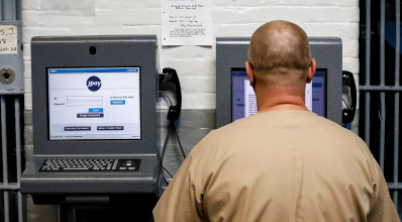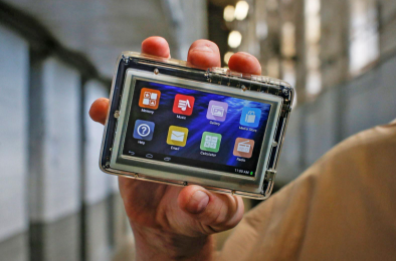JPay: Is taking advantage of inmates and their loved ones worth the profit?

March 27, 2022
For over a week, a little girl has been working on a drawing for her father, who is incarcerated. She wants to make sure she picks the best colors and ensure that everything is perfect so that her dad will love it. No matter what color it is or what the picture looks like, her dad is sure to adore it. As the girl gets ready to send her father the drawing, she kisses it as if her dad will be able to feel it. In spirit, he does. However, when her dad gets the picture, it’s not the actual one. No, it’s a scan. Where the original copy went is unknown. The father can no longer feel the crayon on the paper his daughter once touched. He can no longer smell the paper to get even the slightest hint of his daughter’s scent. He can no longer show everyone the beautiful painting his daughter drew for him. He can no longer hold it in his own hands. This is the reality for some inmates—the result of the big corporation that is JPay, which is capitalizing off inmates and their loved ones.
Recently, The Florida Department of Corrections has decided to turn to JPay and digitize inmate mail. Articles such as cards, letters, or drawings will only be available as a scan on a tablet. Defending such a decision, Florida claims that the delivery system is essential to prevent the flow of dangerous contraband into its 143 state prison facilities.

Consequently, it is affecting the inmates’ loved ones and is burning holes into their pockets: in controlling the mail, JPay’s profits will inflate with dollars spent by both inmates and their families. They are charged for the things that we do for free, such as communicating on the phone. Clean shirts, toothpaste, soap, and other essential hygiene products are obscenely overpriced, and it is all coming out of the pockets of their families. Briefly included earlier, scans of mail are available through tablets, and even then, their families are billed for the purchase or rental of those devices. These tablets hold email conversations and can be used to watch movies or play music. To send an email, stamps are required, costing $4.40 for 11, $11 for 27, $18 for 49, and $25 for 77. The cost for a 15-minute call can be as high as $24.80. An FCC report discovered that 34% of families would go into debt to maintain communication with an incarcerated family member. For them to rent a movie can cost up to $7.99 to rent for 30 days, the ‘viewing period’ only 48 hours. We aren’t even spending that much to rent a movie on Amazon, not to mention the array of movies available to them on the tablet does not have much variety.

JPay and the system fail to realize the burden those costs are putting on lower-income families. Families shouldn’t have to spend nearly $25 to speak to a sister, a brother, a mom, a dad, a cousin, a friend, A LOVED ONE for 15 minutes. They should not have to spend obscene money for their family members to be and feel comfortable in prison. Inmates shouldn’t have to wish they were holding a physical copy of a card instead of looking at it on a screen. It is unfair. Things like this cause so many people to go back into the system when they’ve been released. We are failing them, and we must make a change